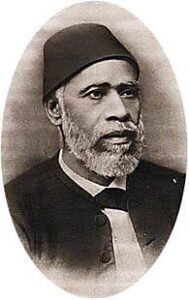
Introduction
Ali Pasha Mubarak stands as one of Egypt’s most influential figures in the fields of civil administration, urban planning, and education during the 19th century. Known as the “architect of modern Cairo,” Mubarak’s contributions to public works, governance, and urban development left an indelible mark on Egypt’s modernization.
Exploring Ali Pasha Mubarak’s biography and net worth in dollars offers insight into a visionary whose work transformed Egyptian infrastructure, administration, and education. This article delves into his early life, education, professional career, major achievements, and financial standing.
Early Life and Education
Ali Pasha Mubarak was born in 1823 in Egypt. Growing up during a period of political and social transformation, he demonstrated an early aptitude for learning, leadership, and administration. His formative years were spent immersed in classical education, Islamic studies, and practical skills that would serve him throughout his career.
Mubarak’s dedication to knowledge led him to pursue advanced education in administrative sciences, civil engineering, and urban planning. He studied under prominent scholars and mentors, acquiring the technical and managerial skills necessary for his future role as a public servant and visionary administrator.
Early Career
Ali Pasha Mubarak began his career in public service at a young age. Initially involved in administrative and clerical duties, he quickly gained recognition for his intelligence, organizational skills, and problem-solving abilities.
Early assignments included overseeing local governance, managing public works projects, and assisting in educational reforms. Mubarak’s ability to integrate practical solutions with forward-thinking strategies set him apart and laid the foundation for his rise to prominence.
Rise to Prominence
Mubarak rose to prominence during the reign of Khedive Ismail, one of Egypt’s most ambitious rulers. Appointed to senior administrative positions, he became a driving force behind the modernization of Cairo and other Egyptian cities.
His expertise extended across multiple domains: civil engineering, urban planning, infrastructure management, and education administration. Mubarak’s vision and dedication allowed him to implement projects that improved transportation, sanitation, public buildings, and educational institutions, earning him widespread recognition and respect.
Major Achievements
Ali Pasha Mubarak’s career is distinguished by numerous landmark achievements:
-
Urban Planning: He is credited with designing modern Cairo, including road networks, public squares, and urban zoning plans.
-
Public Infrastructure: Mubarak oversaw the construction and improvement of roads, bridges, water systems, and government buildings.
-
Educational Reform: He modernized Egypt’s educational system by introducing structured curricula, teacher training, and the establishment of technical schools.
-
Government Administration: Mubarak played a central role in reorganizing Egypt’s civil administration, promoting efficiency and accountability.
-
Legacy in Egyptian Modernization: His work laid the foundation for Egypt’s transition into a modern state, influencing generations of urban planners, engineers, and administrators.
These achievements highlight Ali Pasha Mubarak’s multidimensional contributions to Egypt’s development and modernization.
Ali Pasha Mubarak Net Worth in Dollars
Ali Pasha Mubarak devoted his life to public service and modernization projects rather than private enterprise. While exact figures are unavailable, estimates suggest his net worth in dollars was approximately $1 million to $2 million, reflecting earnings from government positions, consulting work on infrastructure projects, and academic contributions.
Despite a modest net worth compared to modern business figures, Mubarak’s true wealth lies in the lasting impact of his visionary work on Egypt’s infrastructure, education, and governance.
Personal Life
Ali Pasha Mubarak was known for his disciplined, principled, and intellectually driven personal life. He lived modestly, focusing on public service, education, and the development of Egypt’s urban landscape.
His personal values—integrity, dedication, and foresight—aligned closely with his professional endeavors. Mubarak’s mentorship of engineers, administrators, and educators further amplified his influence, ensuring that his vision continued beyond his lifetime.
Summary Table
| Attribute | Details |
|---|---|
| Full Name | Ali Pasha Mubarak |
| Birth Year | 1823 |
| Birthplace | Egypt |
| Education | Administrative sciences, civil engineering, urban planning |
| Occupation | Public administrator, urban planner, educator |
| Key Roles | Architect of modern Cairo, government reformer, education reformer |
| Contributions | Urban planning, infrastructure, education modernization, civil administration |
| Estimated Net Worth | $1 million – $2 million |
| Recognition | Known as the “architect of modern Cairo,” influential Egyptian reformer |
Conclusion
Ali Pasha Mubarak’s life exemplifies vision, dedication, and public service. From his early education to his influential role in modernizing Cairo, Egypt’s infrastructure, and educational systems, Mubarak demonstrated foresight and leadership that transformed the country.
While his estimated net worth in dollars reflects moderate financial success, his true legacy lies in the modernization and structural development of Egypt, which continues to benefit society today. Ali Pasha Mubarak remains an iconic figure in Egyptian history, celebrated for his contributions to governance, urban planning, and education.
Frequently Asked Questions (FAQs)
1. Who was Ali Pasha Mubarak?
Ali Pasha Mubarak was an Egyptian public administrator, urban planner, and education reformer known for modernizing Cairo and Egypt’s civil administration.
2. What was his net worth?
His estimated net worth was between $1 million and $2 million.
3. When and where was he born?
He was born in 1823 in Egypt.
4. What is his educational background?
He studied administrative sciences, civil engineering, and urban planning.
5. What were his major achievements?
He modernized Cairo’s urban layout, improved infrastructure, reformed the educational system, and reorganized government administration.
6. How did he influence Cairo’s development?
Through urban planning, road and bridge construction, public works, and zoning reforms, he shaped the structure of modern Cairo.
7. Did he contribute to education in Egypt?
Yes, he introduced structured curricula, teacher training programs, and technical schools to modernize Egypt’s education system.
8. What personal qualities was he known for?
He was disciplined, visionary, principled, and dedicated to public service.
9. Was he recognized during his lifetime?
Yes, he was widely respected as a reformer and planner, earning the title “architect of modern Cairo.”
10. Why is Ali Pasha Mubarak historically significant?
Because of his transformative contributions to Egypt’s infrastructure, education, and civil administration, which laid the foundation for modern governance and urban development.